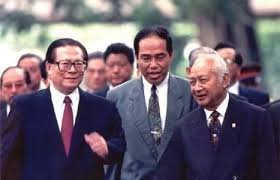The way I see it is that whilst Japan, South Korea, and Australia already have defence and security treaties with the US; NZ has but is suspended, the other Indo Pacific nations especially most of the ASEAN members prefer to have a more non aligned status and they also prefer discussions and mutual agreement over hard and fast Treaty based systems.My question is whether there's even a need for a NATO type alliance in the region - will really lead to enhanced peace and stability or will it just benefit a select few countries? Is a NATO type alliance really needed or it is something which looks sound but might not solve anything or actually deter anybody [read China]. Might lead to a more insecure China which becomes more assertive. Also, to have a meaningful impact such an alliance should include various regional.countries and not countries which are already closely aligned to the U.S.
NZ isn't in a defence Treaty relationship with any other nation except Australia.As it stands the Philippines and Thailand are non NATO treaty allies of the U.S; Australia, New Zealand, Japan and South Korea are treaty linked; Singapore is not treaty linked but has close ties and Malaysia is officially non aligned but has longstanding and extensive defence ties with the U.S. and Australia and plays host to the only base Australia has on foreign soil. As for India it seeks closer ties with the U.S. but actually being part of an alliance might not be in line with its interests.
@Vivendi You need to look at history and SEATO didn't work because the Asian nations weren't interested. It didn't suit their style or the Asian way of doing things. It's very much a cultural thing and in their eyes it would have the look of something being imposed upon them by outsiders; a colonial imposition and they had just got rid of their colonial overlords. The Americans didn't understand that then and I doubt if they understand it now. The Australians may understand it a bit more but not much because they still have a very Eurocentric ethnic viewpoint. Geographically they and NZ are of Asia, but culturally and ethnically whilst their indigenous populations are Aboriginal and Polynesian, culturally they are very much still white Anglo Saxon Protestant, although NZ is slowly changing culturally. Australia has just started on that journey. If you look at the way the Pacific Islands Forum works you will find a similarity to how the likes of ASEAN works.
The next thing that you need to consider is the individual countries, their ethnic and religious divisions, their stability, the relationship that each country has with each other, their colonial history, and how their borders were drawn by the colonial powers. That all makes a huge difference and if your look at Myanmar / Burma the British drew arbitrary boundaries that didn't reflect the ethnic, political and religious divisions on the ground. The same with the Dutch in Indonesia, British in India, French in Indo-China and so on. You see the same in the Middle East when the French and British drew arbitrary lines on a piece of paper dividing up the region between them - the infamous Picot-Sykes Agreement, which turned out real good didn't it
Last edited by a moderator:


